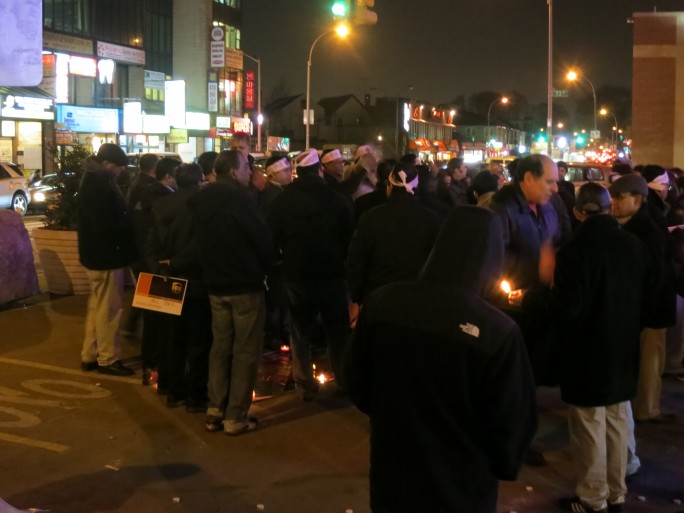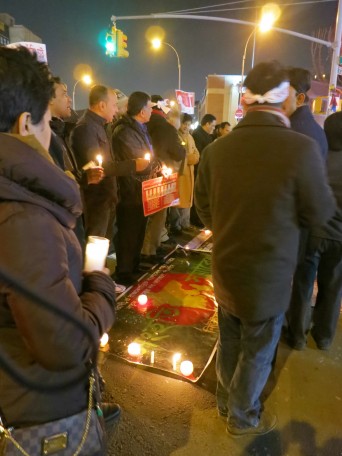THIS past Valentine’s Day many New Yorkers were rushing home from work, stopping at the deli to buy flowers, heading out to a romantic dinner with a loved one. But in the Jackson Heights section of Queens, the Bangladeshi community was concerned with another thing entirely.

Bangladeshis gather in Jackson Heights, Queens, to protest the February 5 verdict of a war crimes tribunal in Bangladesh.
At a busy pedestrian mall, near the intersection of Broadway and Roosevelt avenues, about 40 people were crowded together, chanting angrily in unison. They wore headbands and carried signs written in Bengali. After a while each member of the group lit a candle and laid their posters down on the street. Framed by candles, the tableau resembled an altar. One poster showed men’s faces on a red background framed with rope, a noose. The crowd continued to chant.
“We are demonstrating against war criminals of Bangladesh,” says Mumu Ansari, a small woman with intense eyes, who pulls away from the group to talk to me about the protest. “We want capital punishment!”
According to Reuters, on February 5 a Bangladeshi war crimes tribunal sentenced Abdul Quader Mollah, 64, a senior leader of the country’s biggest Islamist party, Jamaat-e-Islami, to life in prison. Mollah was found guilty of charges including murder, rape, torture and arson during Bangladesh’s war for independence from Pakistan in 1971. During the conflict about 3 million lives were lost and thousands of women were raped. For the protesters in Jackson Heights, Mollah and his party symbolize all of this violence and trauma.
“They are rapists—they murdered our Bangladeshi people—thousands of mothers and sisters, and now the court gave them life imprisonment. We don’t want that,” continued Ansari. The protest in Jackson Heights was in solidarity with other massive protests, also demanding the death of Mollah and other accused war criminals, around Bangladesh.
Bangladesh became part of Pakistan at the end of British rule in 1947, but in 1971, after a nine-month war between Bangladeshi nationalists, who were backed by India, and Pakistani forces, it became independent. Some factions in Bangladesh opposed the break with Pakistan, and numerous abuses were committed.

Mistrustful of the Bangladeshi justice system, protesters demand capital punishment for war criminals to prevent the possibility of further crimes.
Jamaat-e-Islami was accused of opposing the campaign for independence from Pakistan and helping the Pakistani army during the war. According to Reuters, Jamaat denies this. The party is still active and powerful in Bangladesh and has dismissed the tribunal as motivated by its political rivals. It has called for general strikes and protests of its own in the capital city Dhaka and around the country.
The tribunal delivered its first verdict in January, sentencing a former member of Jamaat-e-Islami and popular Islamic preacher, to death. A precedent therefore exists for capital punishment in these cases. It is unclear why Mollah was given a lesser punishment.
Capital punishment is frowned upon, if not banned, in much of the developed world; a nation can’t join the European Union if it has the death penalty. War criminals tried at the International Criminal Court in The Hague, including Charles Taylor of Liberia and Slobodan Milosevic of the former Yugoslavia, are not put to death.
Why isn’t life in prison sufficient in Bangladesh? Bulbul Hasham, another vocal protester in Jackson Heights, explains: “If the regime changes, if the government changes, there is always a fear in third-world countries that they can be freed and they can do the same killings and tortures again.” Hasham says that if there were laws and regulations in Bangladesh like there are in developed countries, as in the United States, he would be satisfied with life in prison. But, in Jackson Heights at least, Bangladeshis seem to have little faith in the government or legal system of their homeland. Many believe that they will be safe only if these war criminals are removed from the face of the earth. “We are Bangladeshis,” Ansari insists, “and as Bangladeshis, we want war criminals to hang.”